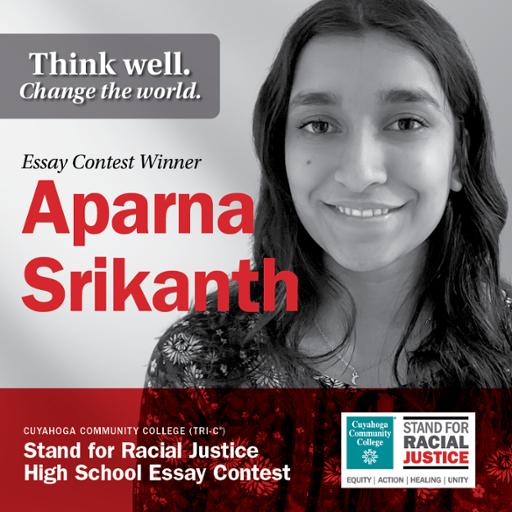‘Stand for Racial Justice’ High School Essay Contest Winner: Aparna Srikanth
 Cuyahoga Community College recently asked Northeast Ohio teens to weigh in on a question society often struggles to answer: What is racism, and what should we do about it? Nearly 200 students answered.
Cuyahoga Community College recently asked Northeast Ohio teens to weigh in on a question society often struggles to answer: What is racism, and what should we do about it? Nearly 200 students answered.
The following essay by Aparna Srikanth of Solon was the third-place winner in the sophomore-freshmen group. She is a student at Solon High School.
The fanfare of epiphany doesn’t suddenly crash, like a star to earth, without reason. It approaches silently. Building tension with conflict, heartbreak, loss and injustice. Patiently waiting for its moment to dramatically arrive and free a constricted mind - or in this case, constrict a blissfully ignorant one.
This summer, for millions of Americans epiphany arrived in all of its striking glory, taking the life of an innocent man with it. George Floyd’s death was the catalyst for a lot of things. Anger, confusion, but most importantly, the realization of the blatant racial discrimination that our country has sheathed for decades. A realization that became harder with every story heard. For every elevator ride alone with a stranger clutching their purse a little tighter; for every racial slur silently flying under the breath of children sitting in the back of a classroom; for every image of death dancing in front of the eyes of someone with a police officer knocking on the glass of their car window. With each story and experience shared, the epiphany seemed more humiliating than heartbreaking. These experiences all amounted to that built up tension that was required to lead us to this realization. But why was it required? Why did it take the loss of an innocent life to truly recognize the racial tension that our country is so blatantly charged with?
It would be easy to have sympathy for the black community. It would be easy to relax, and feel sorry for those affected by those stories. But that sympathy comes from a position of power and privilege. What change truly desires is empathy. Empathy, and the realization that the only thing separating one’s life from the tragedy and violence of racism … is luck.
In the months following the movement that epiphany had gifted our country, something had changed. Racial equality was prioritized in ways that history had never seen and the vision of justice seemed slightly sharper. But every now and then, this vision blurs ever so slightly, proving the simple fact that not enough has changed. Because the truth is there is no cure for racism. There is no class that can be taken to destroy the inherent values that racism stems from. Colorblind people can’t help but seeing the world in black and white. What’s fixable is bias. Whether it’s towards a specific individual, a broader gender or an entire race, bias finds a home in the darkest corners of society. But with education and basic empathy, we can scrape out those corners and shine a light of change upon them.
It starts with empathy. Having the decency to care about those who struggle in this world. This prompts education. Taking the time to learn about such struggles and share the knowledge with others. And finally, epiphany: The realization that justice is still a blurred image that ignorance and sympathy will never clarify. Hopefully, this epiphany does its job and reminds us of how much we have the power to change.
The Stand for Racial Justice High School Essay Contest was sponsored by Tri-C’s Jack, Joseph and Morton Mandel Humanities Center in partnership with cleveland.com, The Plain Dealer and Sun News.
January 15, 2021
John Horton, 216-987-4281 john.horton@tri-c.edu
